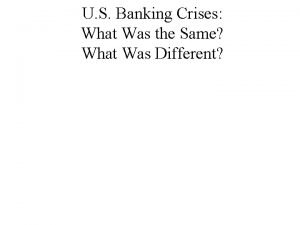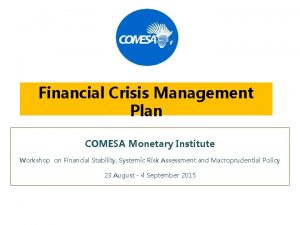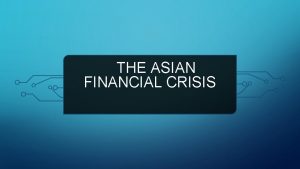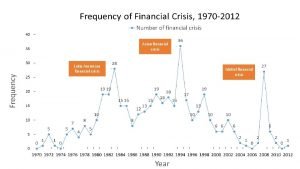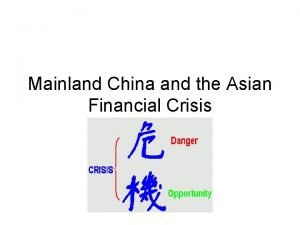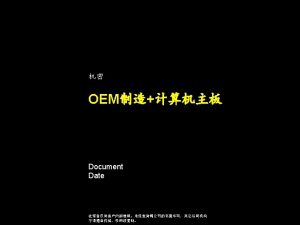1997 Asian financial crisis The Asian financial crisis












- Slides: 12

1997 Asian financial crisis

• The Asian financial crisis was a period of financial crisis that gripped much of Asian beginning in July 1997, and raised fears of a worldwide economic meltdown due to financial contagion(金融 危机的蔓延).

韩国 泰国 菲律宾 马来西亚 印度尼西亚 新加坡 The countries most affected by the 1997 Asian financial crisis.

Though there has been general agreement on the existence of a crisis and its consequences, what is less clear are the causes of the crisis, as well as its scope and resolution. Indonesia, South Korea and Thailand were the countries most affected by the crisis.

Hong Kong, Malaysia, Laos(老挝) and the Philippines were also hurt by the slump. China, Taiwan, Singapore, Brunei (文莱) and Vietnam(越南) were less affected, although all suffered from a loss of demand confidence throughout the region.

Consequences • The crisis had significant macroeconomic (宏观经济)-level effects, including sharp reductions in values of currencies, stock markets(股市), and other asset prices of several Asian countries. The nominal U. S. dollar GDP of ASEAN fell by US$9. 2 billion in 1997 and $218. 2 billion (31. 7%) in 1998. In South Korea, the $170. 9 billion fall in 1998 was equal to 33. 1% of the 1997 GDP.

• Many businesses collapsed, and as a consequence, millions of people temporarily fell below the poverty line in 1997– 1998. Indonesia, South Korea and Thailand were the countries most affected by the crisis.

• This created grave doubts on the credibility of IMF and the validity of its high-interestrate prescription to economic crisis.

• The economic crisis also led to a political upheaval, most notably culminating in the resignations of President Suharto(苏哈 托) in Indonesia and Prime Minister General Chavalit Yongchaiyudh(差瓦立· 永猜裕) in Thailand.

• There was a general rise in anti-Western sentiment(反西方情绪), with George Soros(乔治·索罗斯 ) and the IMF in particular singled out as targets of criticisms. Heavy U. S. investment in Thailand ended, replaced by mostly European investment, though Japanese investment was sustained. Islamic and other separatist movements intensified in Southeast Asia as central authorities weakened.

• More long-term consequences included reversal of the relative gains made in the boom years just preceding the crisis. Nominal US dollar GDP per capital fell 42. 3% in Indonesia in 1997, 21. 2% in Thailand, 19% in Malaysia, 18. 5% in South Korea and 12. 5% in the Philippines.

洪晓梦 洪晓芹 洪奕玲 黄佳佳 20080151106 20080150306 20080151008 20080150510
 Asian financial crisis
Asian financial crisis Itk sisekliinik
Itk sisekliinik Financial crisis management plan
Financial crisis management plan Showa financial crisis
Showa financial crisis 101012 bằng
101012 bằng Lời thề hippocrates
Lời thề hippocrates Thang điểm glasgow
Thang điểm glasgow đại từ thay thế
đại từ thay thế Vẽ hình chiếu đứng bằng cạnh của vật thể
Vẽ hình chiếu đứng bằng cạnh của vật thể Quá trình desamine hóa có thể tạo ra
Quá trình desamine hóa có thể tạo ra Thế nào là mạng điện lắp đặt kiểu nổi
Thế nào là mạng điện lắp đặt kiểu nổi Sự nuôi và dạy con của hổ
Sự nuôi và dạy con của hổ Các châu lục và đại dương trên thế giới
Các châu lục và đại dương trên thế giới
